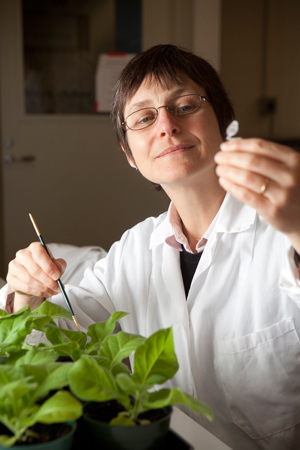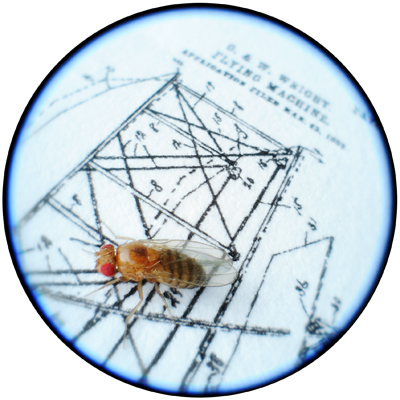Researchers digest how gut 'bugs' affect health
By Sarah Thompson

We might be what our bacteria eat, says a Cornell entomology professor, who is using the tiny fruit fly to investigate this gutsy idea.
“We are gleaning exciting new insights into the importance of the gut microbiota for human health and susceptibility to disease, but the diversity and complexity of humans’ microbiota make it difficult to study,” said Angela Douglas, the Daljit S. and Elaine Sarkaria Professor of Insect Physiology and Toxicology. “Because of the simplicity of its microbiota, drosophila provides the opportunity to investigate the mechanisms behind microbial effects on animal and human health. Using these insights, scientists can then construct precise hypotheses for testing in mammals and humans.”
To study animal-microbe interactions, Douglas has teamed up with Greg Loeb, Cornell professor of entomology, and John Jaenike, professor of biology at the University of Rochester. They are co-principal investigators on a $2 million National Science Foundation (NSF) Dimensions of Biodiversity research grant that was awarded last fall.
From earlier studies, Douglas found that the gut of the fruit fly Drosophila contains tens of microbe species, versus the hundreds to thousands found in humans. This finding is the basis for Douglas’ current research, which focuses on two fundamental questions: Can we predict what microbes (especially bacteria) do from their species composition? And, how do bacteria interact with the animal host to impact its function and evolutionary change in the fruit fly populations?
While aimed primarily at building a better understanding of our planet’s diverse bacterial world and its function, the NSF grant is also helping battle New York’s newest pest, Drosophila suzukii, or the spotted-wing drosophila. This invasive species, which reached New York last year, feeds on soft summer fruit and berries. By studying the composition of this species’ gut microbes and how it impacts the fly’s ability to process these fruits, Douglas and her colleagues can potentially find new ways to control the pest.

“We know microbes influence the traits of their animal or plant hosts, including susceptibility to disease, capacity to utilize certain foods, and their general health and fitness. These impacts can influence the habits of the animal or plant hosts and, ultimately, their evolution and diversification,” Douglas said.
The NSF Dimensions of Biodiversity grant awards are part of a worldwide project to catalog the Earth’s biodiversity, but they’re also a coordinated attempt to speed the rate of discovery of new species to outpace the increasingly rapid loss of the planet’s diversity.
To help raise awareness of these issues, Douglas and her research colleagues will conduct public talks and hands-on demonstrations at the Rochester Museum and Science Center “Science Saturdays,” and host a public photography exhibition on the Cornell campus next April highlighting the beauty, complexity and diversity of animal-microbe relationships.
Said Douglas: “As with fundamental understanding of hormone function, embryological development, nervous system function and many other aspects of biology, drosophila offers a fascinating model to study relationships between animals and their microbiota.”
Sarah Thompson is a freelance writer based in Trumansburg, N.Y.
Media Contact
Get Cornell news delivered right to your inbox.
Subscribe